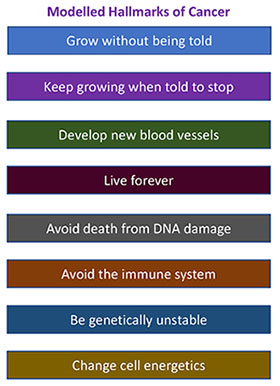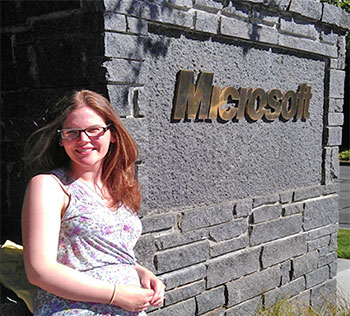Slaying the Beast
Jenna Butler, a Computer Science PhD student at Western University, calls it the silent killer. It is one of the most relentless and unsympathetic diseases, with more than 500 Canadians being diagnosed and 200 dying every single day. The World Health Organization predicts that annual diagnosis will rise from 14 million in 2012 to 22 million within the next 2 decades, and more than half will not survive. The killer is cancer, and it robbed Butler of her mother.
 At the mere age of 14 when her mother passed, Butler grew determined to understand and silence the killer. “At the time, I wanted to cure cancer so no other child would have to go through what I was experiencing,” says Butler.
At the mere age of 14 when her mother passed, Butler grew determined to understand and silence the killer. “At the time, I wanted to cure cancer so no other child would have to go through what I was experiencing,” says Butler.
After completing her undergraduate degree in Bioinformatics, Butler began graduate studies in Computer Science in 2009. Under the supervision of Dr. Mark Daley, Butler has spent the last six years examining what makes cancer such a fatal disease, and how to stop it dead in its tracks.
Butler’s research focuses on creating a computer simulation of a cancer tumor and predicting what treatments will most effectively combat the disease. “I simulate the effects of drugs on the hallmarks of cancer, which are characteristics allowing it to grow into a tumor,” says Butler. “By removing certain hallmarks from the simulation, I can see how the treatments will impact tumor growth,” says Butler.
 The simulation begins with a healthy cell that grows into a tumor, and as it grows, this new mother of two can use the computer program to attack the hallmarks with various drug combinations. Butler works with massive amounts of data that would take hundreds of years to analyze without a computer-simulated model. Her faster, safer, and more effective method results in a greater depth of knowledge, to which we would not otherwise have access.
The simulation begins with a healthy cell that grows into a tumor, and as it grows, this new mother of two can use the computer program to attack the hallmarks with various drug combinations. Butler works with massive amounts of data that would take hundreds of years to analyze without a computer-simulated model. Her faster, safer, and more effective method results in a greater depth of knowledge, to which we would not otherwise have access.
“What we’ve found is that some of the drug combinations actually speed up tumor growth,” comments Butler. “However, other combinations prevent the tumor from receiving nutrients and slowly stop its growth.”
Although some combination drug treatments do exist and have proven to be successful, Butler notes that they are not available or effective for all types of cancer: “That’s the beauty of researching these hallmarks because they can be applied to almost every type of cancer, and we can be sure of what effect a drug combination will have on the tumor before it’s put on the market.”
 Butler’s work has made significant contributions to cancer research, but she acknowledges much more could be done with it. “My research focuses on early tumor growth, before it starts spreading,” says Butler, “It would be difficult but immensely valuable to study the effects of these combination treatments on a tumor in the later stages of growth.” Butler hopes in the future that a wide-ranging simulation model like hers will become specific enough to gear towards individual patients with different types and stages of cancer, and determine what it will take to save these lives.
Butler’s work has made significant contributions to cancer research, but she acknowledges much more could be done with it. “My research focuses on early tumor growth, before it starts spreading,” says Butler, “It would be difficult but immensely valuable to study the effects of these combination treatments on a tumor in the later stages of growth.” Butler hopes in the future that a wide-ranging simulation model like hers will become specific enough to gear towards individual patients with different types and stages of cancer, and determine what it will take to save these lives.
Once Butler defends her PhD thesis in May of 2015, she and her family will be heading to Seattle, Washington. “I was offered a job at Microsoft after completing three summer internships there during my graduate studies,” says Butler, who accepted the job as a Software Development Engineer. “I believe Microsoft will be making some cancer research positions available soon, and I’ve got my eye on that opportunity,” says Butler.

